As many of you might remember, the Georgia Council on Developmental Disabilities (GCDD) introduced a legislative agenda that focused on “disability in ALL policy” for the first time during Georgia’s 2020 legislative session. Our idea for this type of legislative agenda is to ensure that people with disabilities and their families are considered in all areas of legislation.
GCDD’s Legislative Priorities:
Last year, our public policy team worked with numerous organizations and legislators to make sure that the perspectives of people with disabilities were being considered. This included any policy area from school choice to elevator compliance. As a result, the voices of the disability community are being represented in new and innovative spaces.
GCDD plans to continue our efforts centered around “disability in ALL policy” during the upcoming 2021 session. In addition to our efforts to incorporate disability perspectives across all policy areas, we will be focusing on three key priority areas, which will be highlighted during our 2021 Advocacy Days (read more about Advocacy Days logistics here).
HCBS Medicaid Waivers
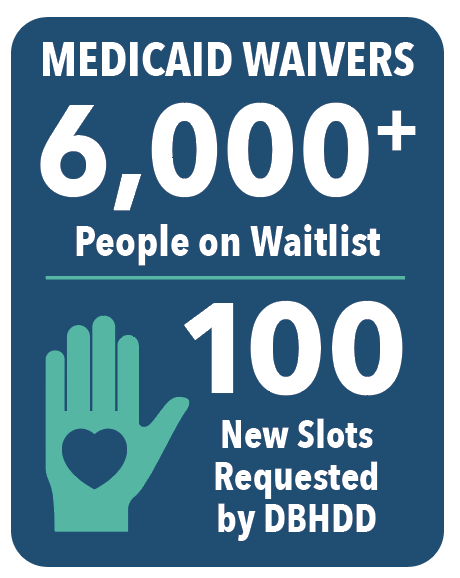 GCDD continues our commitment to highlighting the waiver waitlist, comprised of over 6,000 people, and we will work to ensure that all Georgians with developmental disabilities and their families receive the supports and services they require to be fully included in their chosen communities. Medicaid waivers are necessary components of this work. Last year, GCDD worked with advocates across the state to make sure that new waiver slots continued to be funded, even during significant budget cuts across most state agencies. Although the governor’s office originally recommended zero new waiver slots, the disability community was successful in advocating for the addition of 100 new waiver slots once the final budget was passed and signed by Governor Brian Kemp.
GCDD continues our commitment to highlighting the waiver waitlist, comprised of over 6,000 people, and we will work to ensure that all Georgians with developmental disabilities and their families receive the supports and services they require to be fully included in their chosen communities. Medicaid waivers are necessary components of this work. Last year, GCDD worked with advocates across the state to make sure that new waiver slots continued to be funded, even during significant budget cuts across most state agencies. Although the governor’s office originally recommended zero new waiver slots, the disability community was successful in advocating for the addition of 100 new waiver slots once the final budget was passed and signed by Governor Brian Kemp.
This year, the Georgia Department of Behavioral Health and Developmental Disabilities (DBHDD) has asked for 100 new waiver slots in the upcoming budget. We are glad to see a request for additional slots but remain concerned that these low requests will do little to address the waiting list. For the past few years, a limited number of slots have been funded, which has resulted in no major changes in our large waitlist. Because of this, people with disabilities and their families continue to wait years for needed services. GCDD was encouraged by the creation of DBHDD’s multi-year plan, finalized in 2018, to address the waitlist, and GCDD would like to advocate to ensure DBHDD is receiving enough funding from the General Assembly to reach their goals and objectives. Based on the goals outlined by DBHDD, they would like to be serving 1,950 newly admitted waiver recipients by the summer of 2021.
You can find DBHDD’s multiyear plan, as well as an appendix document outlining specific target numbers, here.
To further shine a light on the waiver waitlist problem in Georgia, GCDD will also officially premiere its documentary “6,000 Waiting” during the upcoming legislative session. We hope these powerful stories of Georgians with disabilities will further highlight the need for additional funding for waivers. You can find out more information about the documentary here.

Inclusive Postsecondary Education (IPSE) Programs
For the past decade, IPSE programs have grown and developed into nine different programs across Georgia. These programs provide inclusive learning opportunities for college students with intellectual disabilities. These students typically would not have the option to attend college, as many do not receive a traditional high school diploma or have difficulty with the competitive admission standards; however, IPSE programs were designed to deliver the true college experience, while preparing students for successful careers post-college. In fact, the employment rate of IPSE students is about 54 percent, compared to just 34 percent for Georgians with disabilities. The employment rate drops to only 24 percent when discussing Georgians with a cognitive disability. You can learn more about Georgia’s IPSE programs here, and you can view more specific employment data for Georgians with disabilities here.
Given the effectiveness and importance of IPSE, GCDD has focused its advocacy efforts on improving the support and funding for the programs during previous legislative sessions. This year, we plan to focus on the 16-percent cut that was made to the programs’ budgets during the last legislative session. Due to COVID-19’s impact on our economy, many services saw budgets cut, but IPSE received a higher cut than many. In addition to the state cuts, IPSE programs have also been negatively impacted by the Georgia Vocational Rehabilitation Agency’s (GVRA) decreased funding model for student support, as well as GVRA’s removal of academic transition teacher (ATT) funding. We plan to advocate to reinstate those funds to ensure the success and sustainability of the programs throughout Georgia.
Competitive, Integrated Employment
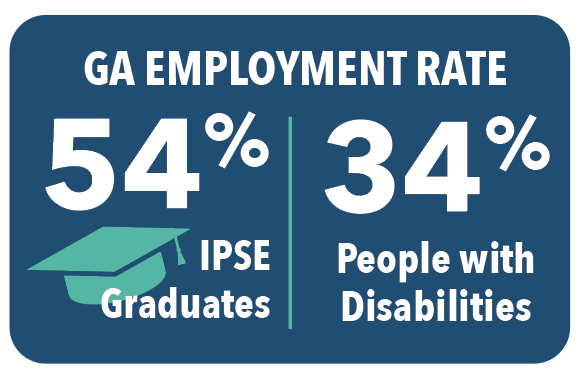 As mentioned above, Georgia’s rate of employment for people with disabilities is very low, even when compared to the national average, and only about 16 percent are working in competitive, integrated employment. This means that only 16.3 percent of Georgians with developmental disabilities have jobs that pay at least minimum wage and are in a workplace in the community, alongside their peers without disabilities, that is not owned or managed by a provider of support services. GCDD is committed to increasing the rate of Georgians who participate in competitive, integrated employment, and we are excited that DBHDD has also committed to this goal.
As mentioned above, Georgia’s rate of employment for people with disabilities is very low, even when compared to the national average, and only about 16 percent are working in competitive, integrated employment. This means that only 16.3 percent of Georgians with developmental disabilities have jobs that pay at least minimum wage and are in a workplace in the community, alongside their peers without disabilities, that is not owned or managed by a provider of support services. GCDD is committed to increasing the rate of Georgians who participate in competitive, integrated employment, and we are excited that DBHDD has also committed to this goal.
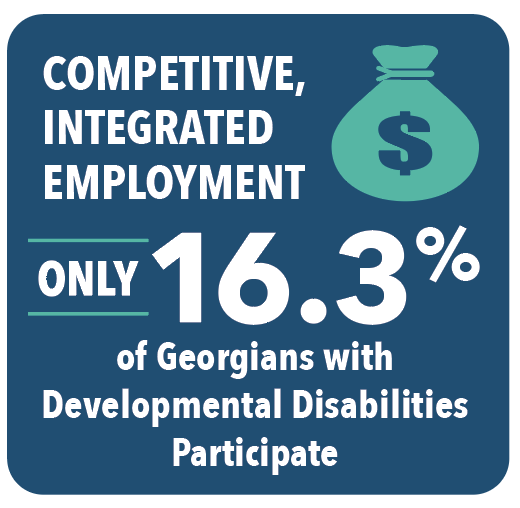
DBHDD has acknowledged the importance of competitive, integrated employment and has presented a goal to triple the rate of Georgians with developmental disabilities who participate in competitive, integrated employment from 16.3 percent to 48.9 percent by 2025. To read more about DBHDD’s employment goal, check out Commissioner Judy Fitzgerald’s blog post here. Join GCDD in helping DBHDD reach that goal by advocating for policies that support and advance competitive, integrated employment in Georgia, while transitioning away from subminimum wage policies!
Other Policy Priorities to Watch
The 2021 legislative session will be the first year of the next biennial session in Georgia. As many of you might know, Georgia has a biennial session that takes place for a two-year period. The 2020 session was the second year of the previous biennial, meaning we are starting fresh with a new two-year period. In addition to the election of each representative and senator, all the bills previously introduced in the last two years will have to be reintroduced if a representative or senator is interested in continuing to pursue the policy priority.
Because we are just now at the beginning of the biennial, the only way we can figure out what bills we might want to watch is by visiting the prefiled legislation list on the General Assembly’s website. This list starts to develop in November before session and gives us our first look at what we might expect. GCDD continues to monitor the introduction of new legislation and can highlight a few areas now; however, the current prefiled list is small and certainly not a complete representation of what the session might bring.
If you would like to monitor what bills have been prefiled, you can find the House prefiles here and the Senate prefiles here.
Bills to Watch
Here are just a few of the prefiled bills* we will be monitoring:
HB 7 Higher Education Access and Success for Homeless and Foster Youth Act
HB 7, introduced by Representative Sandra Scott, aims to assist youth experiencing homelessness and youth in the foster care system in achieving higher education. Given the disproportionately high rate of children with disabilities in the foster care system, we believe this bill could have an impact on our community.
HB 28 Each Statutory Board and Commission Reflect General Population
HB 28, introduced by Representative Dar’shun Kendrick, aims to improve the diversity of boards and commissions by requiring all statutorily created boards and commissions to reflect the general population. We have previously discussed the underrepresentation of people with disabilities in most settings where important decisions are made, and we think this bill could improve the representation of the disability community, which includes almost 25 percent of Georgians.
HB 34 Audiology and Speech-Language Pathology Interstate Compact
HB 34, introduced by Representative Dave Belton, aims to improve the availability and access of audiology and speech-language services by entering into an interstate compact. Given the frequent use of these services by Georgians with disabilities, we believe this bill will likely impact the services received in the disability community.
Although no voting or election bills were prefiled at the time of this writing, we can likely expect a renewed focus on voting and election matters, as these topics have been frequently highlighted in the news since the general election on November 3. We have already had meetings of the Senate Government Oversight Committee and a Sub-Committee of the Senate Judiciary Committee, during which legislators expressed interested in policies that would further strengthen the security of our elections. GCDD will be monitoring these proceedings as the 2021 session progresses.
In addition to the priorities listed, GCDD is committed to monitoring the budget process to ensure there are no cuts to the supports and services that are critical for Georgians with disabilities and their families. The impact of COVID-19 resulted in significant cuts during last session, even as we were able to successfully advocate to minimize some of the cuts. State agencies, at the request of Governor Kemp’s office, presented a neutral budget based on their funding from fiscal year 2021. This means there are no new cuts we currently anticipate; however, the neutral budget also means that state agencies are continuing to fund services at the funding level impacted by deep cuts during the 2020 session. As budget meetings take place, and the budget priorities become clear, GCDD will make sure to keep advocates updated on any areas of concern!
Impact of COVID-19 on the 2021 Session
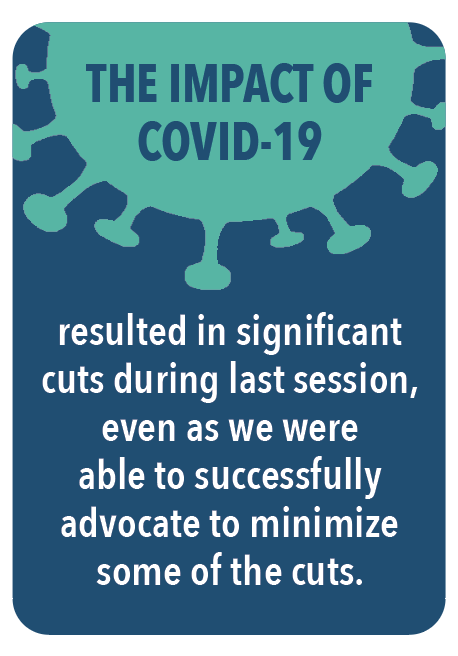 Although COVID-19 might make in-person advocacy difficult during the 2021 session, there are plenty of ways we can still take part in the process. One great way to stay involved is to take advantage of the live streaming of the floor sessions and most committee meetings. Throughout the week during session, the House and Senate calendars will be updated to show which committees are meeting, when they are meeting and what they are meeting about. This information is critically important in helping us stay in-the-know about the happenings under the Gold Dome, even when we can’t be in-person. You can find the House calendar here and the Senate calendar here. Once you’ve decided on the meetings you would like to watch, you can access live streaming by visiting Georgia’s General Assembly website.
Although COVID-19 might make in-person advocacy difficult during the 2021 session, there are plenty of ways we can still take part in the process. One great way to stay involved is to take advantage of the live streaming of the floor sessions and most committee meetings. Throughout the week during session, the House and Senate calendars will be updated to show which committees are meeting, when they are meeting and what they are meeting about. This information is critically important in helping us stay in-the-know about the happenings under the Gold Dome, even when we can’t be in-person. You can find the House calendar here and the Senate calendar here. Once you’ve decided on the meetings you would like to watch, you can access live streaming by visiting Georgia’s General Assembly website.
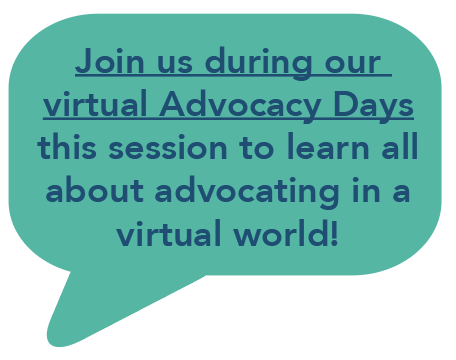
And as always, GCDD’s public policy team is here to help with any virtual advocacy questions you might have! Make sure to join us during our virtual Advocacy Days this session to learn all about advocating in a virtual world!
The Race for the Runoff: Election Updates
 As we all have been aware, based on the numerous commercials, text messages and mailers we received over the past two months, we recently ended the two most expensive senate races in US history.
As we all have been aware, based on the numerous commercials, text messages and mailers we received over the past two months, we recently ended the two most expensive senate races in US history.
On January 6, 2021, both races were officially called for the Democratic senate candidates Reverend Raphael Warnock and Jon Ossoff, and the two Democratic candidates have officially accepted the results and claimed victory. Both men were endorsed by Disability Action for America, and you can view then-candidate Warknock’s response to the endorsement here.
As of the writing of this update*, both races appear outside of the 0.5-percent margin required for a candidate to be able to request a recount. Senator Kelly Loeffler has officially conceded the race to Senator-elect Raphael Warnock. David Perdue has also conceded his race to Senator-elect Jon Ossoff.

*Information current as of January 8, 2021
